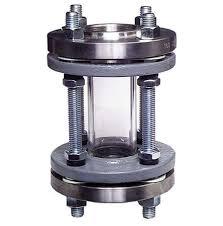Everything You Need to Know About Industrial Sight Glasses

In industry an important part of assuring safety, efficiency, and adequate quality control is accurately monitoring fluids, and gases. As simple as it sounds, a clear view of process conditions, across many areas of industry from chemical plants to manufacturing plants, can go a long way toward preventing costly errors, equipment damage, and unsafe incidents.
Two of the most reliable pieces of equipment for this purpose are industrial sight glasses. Not only are they often a very simple way to view liquids and gases, but they are also an effective means of monitoring what is happening in processes to make sure they run correctly.
What are Industrial Sight Glasses?
Industrial sight glasses are essentially clear devices that are installed on tanks, pipelines, and vessels, to allow operators visual access to fluid levels, flow, and conditions, in industrial systems. They act like windows behind which displays another world that does not shut down the normal operation.
Some of their essential features include:
-
Solid materials for their processes: usually a combination of tempered or borosilicate glass and stainless steel.
-
Ability to withstand high temperature and high pressure: These unit designs are process centric for any kind of industrial applications.
-
Use in various industries: as research focuses on chemical, pharmaceutical, food processing, and petroleum industries.
Types of Industrial Sight Glasses
Level Gauge Sight Glasses
-
Monitors fluid levels in tanks and vessels.
-
Provides a direct visual indication of liquid volume.
Inline Sight Glasses
-
Installed within pipelines for continuous flow observation.
-
Essential for spotting contamination, air bubbles, or blockages.
Reflex Sight Glasses
-
Uses prismatic surfaces to enhance visibility.
-
Typically used in high-pressure applications.
Borosilicate or Tempered Glass Versions
-
They are resistant to thermal shock, and chemical corrosions.
-
They are suitable for high temperature and aggressive chemical applications.
Key Features to Consider
When selecting an industrial sight glass, consider these principal features:
-
Strength - Tempered or borosilicate glass will withstand breakage and pressure.
-
Pressure and Temperature Ratings - To ensure safe operation under specified process conditions.
-
Chemical Compatibility - The materials that will withstand exposure to industrial fluids.
-
Quality of Vision - Anti-fog, anti-reflective or prismatic coating improves visibility.
-
Ease of installation - Quick-mount and maintenance options, which minimize downtime.
Selecting the right features provides ensure safety, durability and dependability.
Advantages of Having Industrial Sight Glasses
Purchasing good quality industrial sight glasses offers a lot of advantages for varying applications:
-
Real-Time Observations: Makes it simple to observe fluids in real-time, levels, and flow without slowing down the processes.
-
Improved Safety: It comes equipped with the capability of early detection of leaks, overflow, or unusual events.
-
More Cost-Effective Maintenance: You can serve the purpose of identifying faulty conditions early, avoiding pricier repairs.
-
Compliance: Safety and operational regulations in most Facilities and plants rely on those indicators or alarm level limits for compliance.
-
Efficiency: Operational efficiency can improve and less downtime will be less disruptive.
What is Missing with Industrial Sight Glasses?
In order to select the right sight glass, consider the following information for evaluation:
-
Type of Process: Is a visual level measurement indicator necessary, or in-line sight observation?
-
Fluid properties: Determine the pressure, ambient, temperature, and chemical composition.
-
Observation criteria: Will the glass product provide adequate visibility for the operators to observe the fluid levels, and what is required by the operators?
-
Material Compatibility: Match the glass type and Frame materials in use with the fluids and feed processes.
-
Maintenance Requirements: Select a sight glass & frame design for the systen that will be easy to clean and thoroughly inspect.
By following this information provided, you can choose your sight glass correctly to not only get reliable and safe meassurement, but reliable future operation.
Maintenance Recommendations for Sight Glasses
Maintenance such as cleaning and sealing, can extend the life of a sight glass and will preserve its working condition:
-
Regular Cleaning: This helps to avoid residue build‐up which deteriorates the sight glass visibility.
-
Regular Inspection: Inspect for cracks, scratches, or leaks.
-
Gasket & Seal replacement: Keeping a seal tight will help maintain pressure and keep you from leaking.
-
Manufacturer Information: Always follow any guidelines as to pressures, temperatures, and handling of the sight glass.
Regular Maintenance ensures the sight glasses will continue to monitor accurately and safely.
Conclusion
Industrial sight glasses are valuable in any facility that uses or processes liquids or gases. Sight glasses provide real-time visibility that increases safety, improves efficiency, and reduces operating costs.
High quality sight glasses that are designed for your process provide reliable performance and peace of mind. Sight glasses should be a vital component of your operation.
- AI
- Vitamins
- Health
- Admin/office jobs
- News
- Art
- Causes
- Crafts
- Dance
- Drinks
- Film
- Fitness
- Food
- Jogos
- Gardening
- Health
- Início
- Literature
- Music
- Networking
- Outro
- Party
- Religion
- Shopping
- Sports
- Theater
- Wellness


